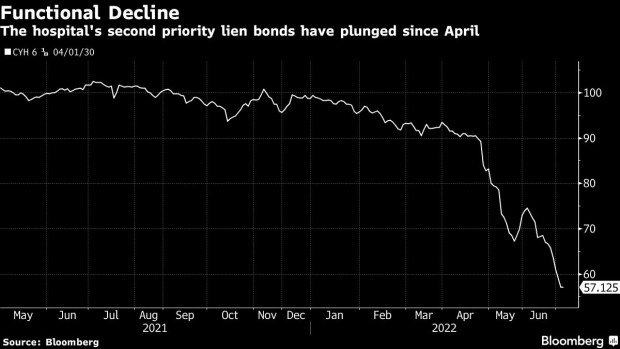New York July 14 2022: In hindsight, maybe it wasn’t a good idea to lend hundreds of millions of dollars at rock-bottom interest rates to a money-losing used-car seller, a payday lender, or a hospital chain in the middle of a pandemic.
But that’s what happened during 2021 amid insatiable demand for junk bond offerings, and now with the economic outlook dimming, some of those newly minted notes are trading like distressed debt.
More than 220 US dollar-denominated corporate bonds issued last year are trading with spreads greater than 1,000 basis points, according to Bloomberg data. That’s a more dismal showing than bonds sold pre-pandemic: around 150 notes issued in 2019 change hands at that level, despite trading for longer.
Collectively, the 2021 issues trade for an average 55 cents on the dollar to yield 13.2%, with average coupons of 7%.
Last year’s excessive optimism and the desperate hunt for yield have given way to recession fears, evaporating liquidity and renewed default fears. These days, the high-yield new issue market has ground almost to a halt, save for a handful of leveraged-buyout deals banks are desperate to have off their books, a sign of how quickly investor sentiment can turn.
“The question is ‘Are we going to have a lot of failures?’” Bob Kricheff, a portfolio manager and global strategist at Shenkman Capital Management, said in an interview. “We haven’t gone through the cycle long enough to see if we’re getting a lot of mistakes in the market, or these companies can figure out how to get through it, or the economy recovers enough for them to survive.”
While the 16% decline for Bloomberg’s high-yield benchmark year to date certainly hurt, the steep drops for issuers in the Class of 2021 also stem from the risky nature of their businesses that earned many them junk credit ratings. Some examples:
Carvana
The online used-car retailer famous for its car vending machines issued $1.35 billion in senior unsecured notes, including $600 million in March 2021 and another $750 million in August against a backdrop of strong used car prices stemming from pandemic supply chain snarls.
Since then, prices have begun to come down. In April, Carvana reported a larger-than-expected loss and said it would take longer than expected to break even. It later struggled to issue new debt to acquire a car auction business, cut jobs and was temporarily stripped of its license to sell cars in Illinois. Throughout it all, the bonds sold last year sunk. Its 2027 notes now yield over 17%, while its 2029 bonds yield 15.2%.
Inotiv
Contract researcher Inotiv Inc. took on debt for the first time in September, with a package that included $140 million of convertible bonds. The 3.25% notes due 2027 would convert at $46 a share. That was in grasp at the end of 2021 when the stock was trading at $42, but seems less likely now that shares have fallen to around $10.46 after a grand jury subpoena related to past imports of primates in February. A few months later the Justice Department alleged violations of the Animal Welfare Act over the treatment of puppies and their mothers in one of its testing facilities.
Inotiv did not respond to a query about the allegations. It has since shuttered the facility involving the dogs as well as a second facility in Ireland. The convertibles can be had for 60.75 cents on the dollar, with a 14% yield.
Community Health Systems
The multi-state hospital system had made demonstrable progress on fixing its heavily indebted balance sheet before the pandemic. Some of its beaten-down debt had actually soared past par by early in 2021, so in May of that year, it sold $1.44 billion of second priority lien bonds maturing in 2030 that pay 6.125%.
They’ve since fallen to below 60 cents with a 15.9% yield as the entire industry struggles with rising labor costs, Covid’s recent resurgence and the prospect of lower government reimbursements.
Audacy
Radio station owners like Audacy Inc. were hit hard too by the stay-at-home impact of the pandemic, cutting into advertising demand. The outlook improved enough by March 2021 to float $540 million of second-lien notes paying 6.75% for eight years.
Alas, the notes plunged to 53 cents this June as big national advertisers fearing a recession pulled back, according to S&P Global Ratings, which cut Audacy to CCC+, saying leverage will increase “and potentially never recover to pre-pandemic levels.”
Issuers Win?
Investors who opted not to participate in the rush of new issuance last year are feeling vindicated. Vanguard’s actively managed funds were among them. Michael Chang, a senior portfolio manager who oversees the $7.5 trillion investment firm’s actively managed high-yield funds, said he expects to see an uptick in defaults over the next 12 to 24 months.
“We thought a lot of these deals were essentially being priced to perfection. These were deals that did not have much margin of error or margin for safety,” Chang said.
There is, of course, a silver lining for distressed specialists looking to snap up credits at substantial discounts after years of drought, but caution still prevails. Matthew Mish, a credit strategist at UBS Group AG, said clients trying to allocate portfolios and find value are struggling to find “a name story” that can work.
“It’s all based on inflation. It’s all based on the Fed and the evolution of Fed policy. The micro stories don’t really matter here,” Mish said.
Meanwhile, “it worked out extremely well for the issuers,” points out Phil Brendel, who follows distressed debt at Bloomberg Intelligence. “It was a fantastic way to push out all their debt and refinancing,” he said. “I certainly don’t think companies feel bad about selling paper.”










